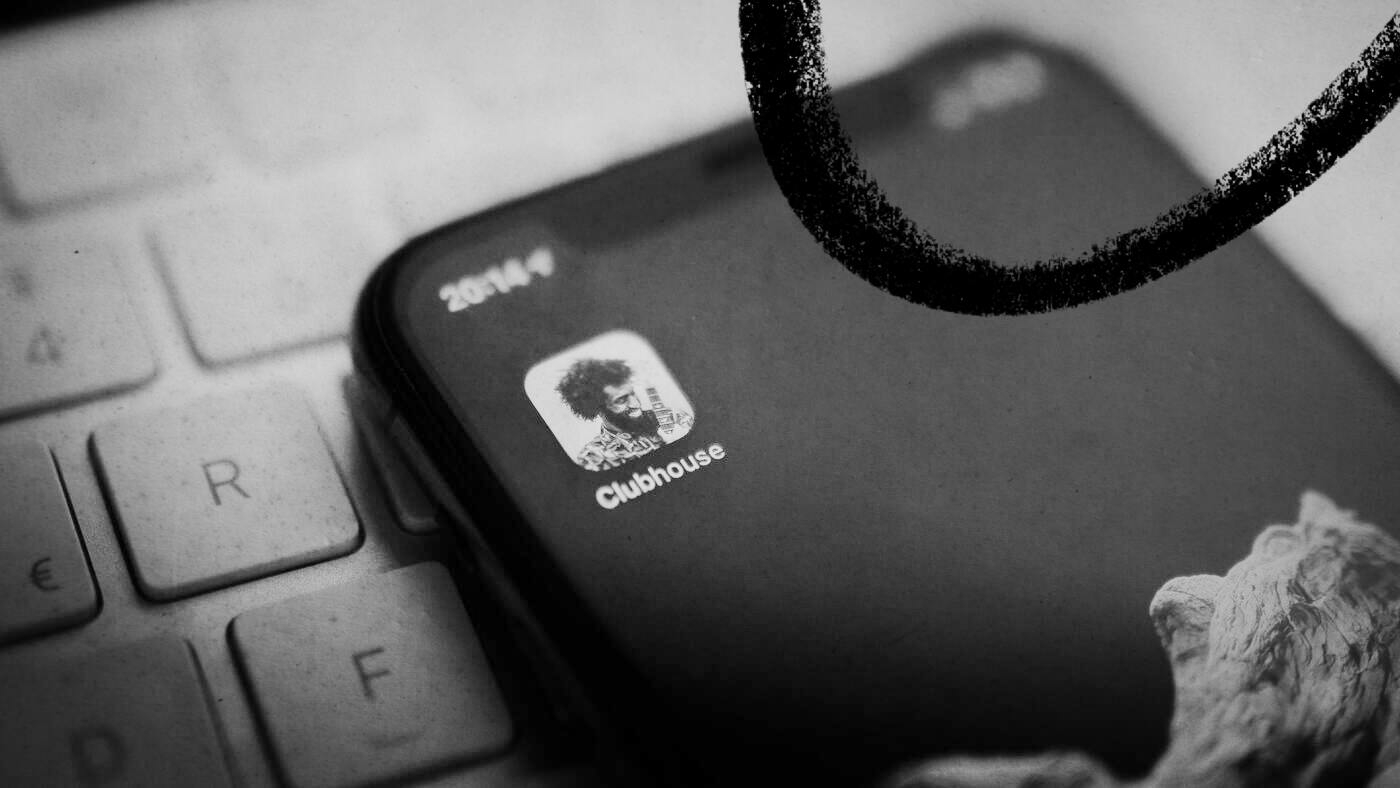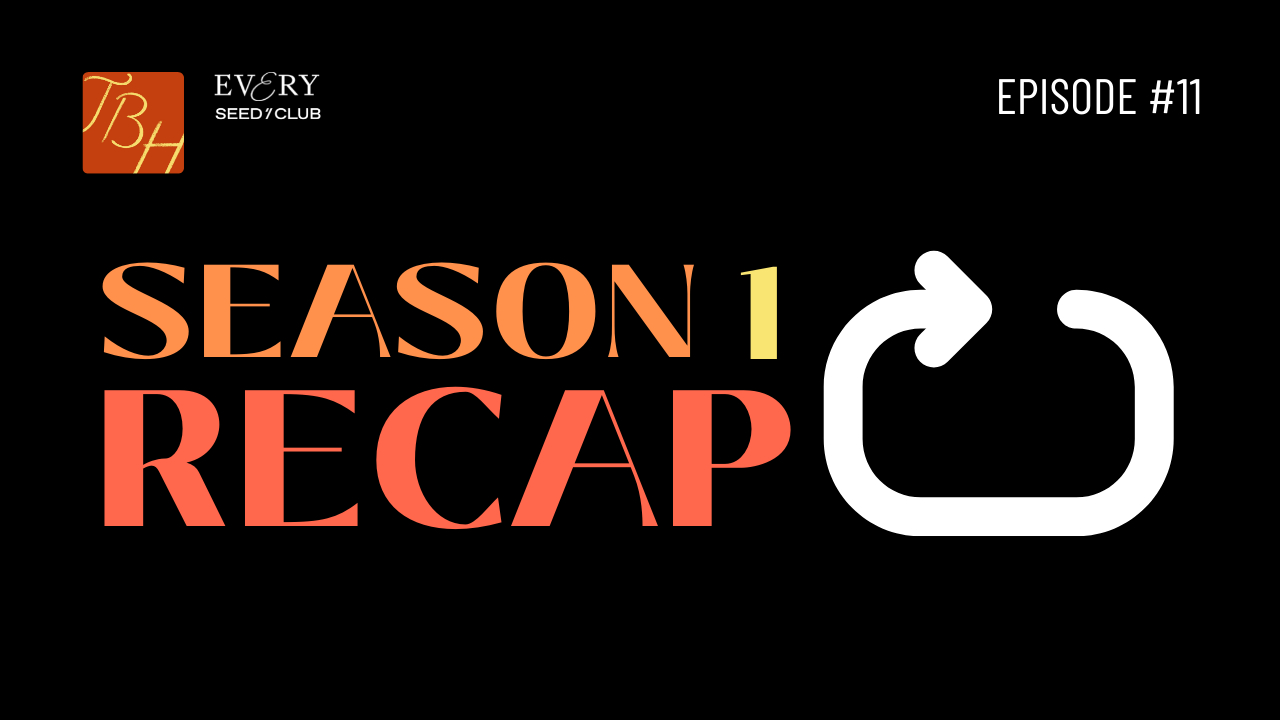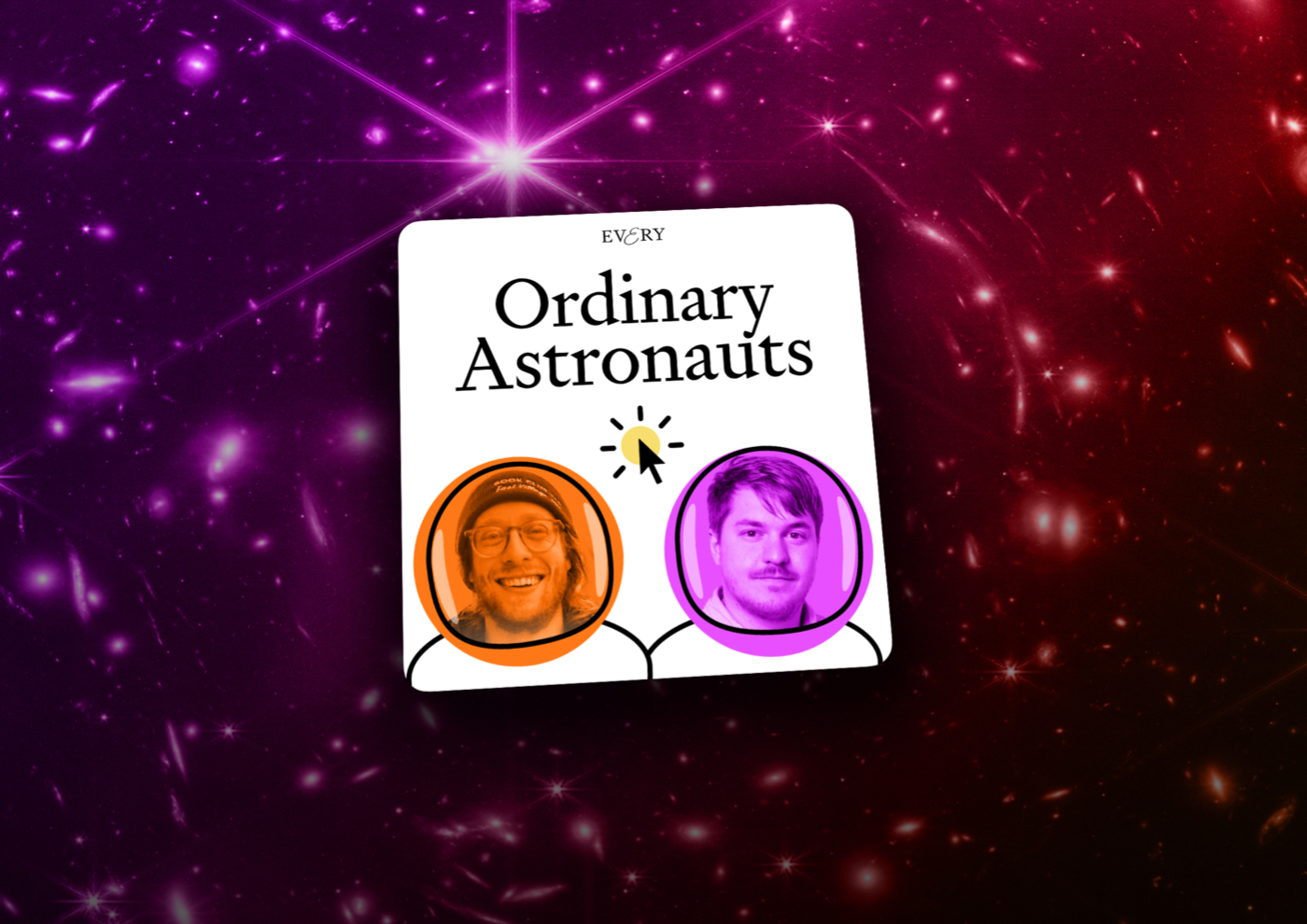
Intelligent Tools, Lessons from Clubhouse, and More
Here's everything we published this week
September 4, 2022 · Updated February 6, 2026
Knowledge Partner: McKinsey & Company
How and where to work next. Selling, general, and administrative functions are integral to your organization’s success. What’s the best place for those people to work? Read here to see how the future of work will take shape.
Happy Sunday!
This week we’ve got essays on AI, the truth about why we use productivity tools, and a glimpse inside Clubhouse. Plus, a retrospective on the first season of Tokens, But How? and a new episode of Ordinary Astronauts that asks what happens when recommendation media replaces social media.
Also: If you haven’t already, make sure you check out the Every Talent Collective on Pallet. We’ve got amazing job opportunities across product, engineering, data, and design. Take two minutes to fill out your profile and you can start fielding intro requests from companies like Atlassian, Snowflake, Vimeo, and Box.
Also: we’re hiring an editor! For more info check out the bottom of this newsletter.
Now, on to the posts!
Intelligent Tools
Nathan Baschez / DivinationsSo far in the history of software, there have been two major revolutions: first, the shift from command-line interfaces to graphical user interfaces; and second, the shift from single-player computing to globally networked computing. Now, a third revolution is underway—one we’re just now beginning to understand.
Historically, when we’ve thought about the development of artificial intelligence, we’ve tended to think of it along the lines of human intelligence. But as Nathan argues in this week’s Divinations, the reality is far more complex—and far more interesting—than that.
When Productivity Tools Make the Problem Worse
Dan Shipper / SuperorganizersWe tend to think about productivity in terms of systems and tools: to-do list and note-taking apps, pomodoros and inbox zero techniques. We think of productivity as a game we can win, if only we have the right gizmos and frameworks in place.
But Dan believes there’s something far more elemental at the heart of productivity. At its core, he argues, it’s all about emotion regulation. When we use productivity tools, what we’re doing is seeking to control our emotional landscapes. It’s a fact we’re not always aware of, and as Dan argues, that has disastrous consequences.
What I Learned at Clubhouse
Anu Atluru / EveryWhen Anu Atluru joined Clubhouse, the app had ~1,000 users. Rooms didn’t have titles and “clubs” didn’t exist yet. The team was just the two founders. Over the next two years, as an early employee and the company’s first Head of Community, Anu watched as the team grew from three to more than 100, and went from serving hundreds to millions of users daily around the world.
In this post, Anu shares 25 lessons from those two years, covering everything from product to community to go-to-market and more. It’s a fascinating glimpse inside one of the most talked about companies of the last few years.
Non-Self-Coercive-Productivity
Pamela Hobart / EveryIt’s all too easy to think of productivity as a fundamentally coercive act: something we have to force ourselves into at the expense of our serenity and maybe even our sanity. But as Pamela Hobart sees it, this is a superficial—and, ultimately, impoverishing—way to think about getting things done.
Instead, Hobart advocates for a style of productivity she calls non-self-coercive productivity. It’s a paradigm in which the operative concepts aren’t pain and force, but rather pleasure and discovery.
Retrospective: Tokens, But How?
Sari Azout & Joey Debruin / Tokens, But How?Sari and Joey went into this season with many questions about how to build token-based products, ranging from the philosophical (Why?) to the operational (How?). Along the way, they talked to some of the most insightful and visionary thinkers in the space.
Now, in this final episode of Season 1, they’re taking a moment to look back and what they’ve learned—and what still remains to be seen.
This week on Ordinary Astronauts: The rise of “recommendation media”, and are AI image generators ethical?
This week on OA we’ve got two episodes!
First, a truly mind-expanding interview with Anchor co-founder and former Head of Talk at Spotify, Michael Mignano. This wide-ranging conversation covers:
- Why recommendation media—entertaining content from strangers—is replacing social media—content from friends and family
- What strategic motivations platforms like Meta have for making the shift—and how it affects creators
- Where traditional “social media” type content for friends and family is moving
- What could happen when AI content generation keeps getting better
- What role there is in this for Snapchat and Twitter, who are both struggling
Second, in the usual Sunday edition of Ordinary Astronauts, Dan and Nathan discuss three topics:
- Are AI image generators ethical? There are three main arguments against: that they were trained on artist’s works without permission, that they could put artists out of work en masse, and that they could be use for abuse and deepfakes. Dan and Nathan dive into the issues and emerge with a better understanding than they had before.
- Intelligent Tools. Dan and Nathan discuss the most recent Divinations article, in which Nathan argues that we’re now at a point where we can begin to see how AI will actually work in our lives, and move beyond our naïve expectations.
- When Productivity Tools Make The Problem Worse. In Superorganizers this week Dan wrote about how sometimes the thing we are using our tools for is actually more about regulating our emotions than getting things done. For instance, obsessing over a todo list might be a symptom of anxiety that we will let people down. If we can become aware of this, we ca do other things (like reflection and journaling) that might solve the problem more directly.
Check it out!
A Business Insight for the Day
Evan has been doing a ton of research on Vertical Software. The CFO of one of the most interesting companies in the space spoke to Tegus about how many companies they are looking at, and the constraints they are running into. His comments have really interesting implications for future rollups in the Vertical SaaS space:
“We have a database, the last time we publicly disclosed its size we said there were 40,000 opportunities in it. And we're constantly adding more. What we do for our coverage ratio metric is we look at the number of businesses that were sold in a given quarter, and for those businesses that are also in our database, we calculate how many of those transactions we were aware of.
And what we're finding is we are not aware of close to 70% of the transactions, even though the company was in our database, and we supposedly had a relationship with the company. And what it showed us is that there's a lot of businesses that are in the database that we don't have relationships with.
We have done a great job—if you think of the database as a sales funnel—of adding leads to the funnel. But we haven't had time to fully nurture them and turn them into real relationships. We are focused on how we improve that coverage ratio from, let's say, 30% to something higher.
I don't think it will ever get to 100%, but could it get to 60%? Maybe. And if it does, hopefully, we could deploy twice as much capital.”
A Few More Recommendations
Snapchat’s Probably Screwed | Napkin Math
This week, Snapchat became the latest tech company to announce a round of layoffs. For a better understanding of the company’s struggles and where they’re coming from, check out this piece by our very own Evan Armstrong.
Can't stop fighting with your co-founder? Try couples therapy | Protocol
Dan and Nathan recently talked with the fine folks over at Protocol about a topic near and dear to their hearts: couple’s therapy. They’ve been going for a while now—and they’re part of a growing contingent of co-founders. This piece digs into the why behind the trend.
The Twitter Whistleblower Story is Worse Than You Think | Kolide
When ex-Twitter security chief Peter “Mudge” Zatko blew the whistle on the company, a majority of the attention was focused on the economic side of the story, and what it meant for the neverending story that is Elon’s takeover bid. But as this piece argues, the cybersecurity side of the story is being overlooked—and it’s a bigger deal than people realize.
How the Physics of Nothing Underlies Everything | Nautilus
As our understanding of physics grows more and more sophisticated, it’s becoming increasingly clear that the key to understanding the theory of everything might actually be understanding nothing. “So far…studies have led to a dramatic conclusion: Our universe may sit on a platform of shoddy construction, a “metastable” vacuum that is doomed—in the distant future—to transform into another sort of nothing, destroying everything in the process.”
We’re hiring an editor!
We’re looking for a freelance editor to help us at Every! We’re looking for someone to help with a mixture of editorial operations and editing work—everything from managing the editorial calendar to copy edits on pieces before publication.
If that sounds like something you’d be interested in just reply to this email! Send us a link to your LinkedIn, resume, or any past work you’ve done. We’re excited to meet you :)
We’re looking to improve our SEO!
We’d love to find someone to help us improve the SEO on Every’s website. If that’s something you’re good at and want to work with us on it, please hit reply! Feel free to send us examples of your past work, and a little bit about what you might be able to help with.
Thanks!
That's all for this week! Have a great long weekend!
The Only Subscription
You Need to
Stay at the
Edge of AI
The essential toolkit for those shaping the future
"This might be the best value you
can get from an AI subscription."
- Jay S.
Join 100,000+ leaders, builders, and innovators

Email address
Already have an account? Sign in
What is included in a subscription?
Daily insights from AI pioneers + early access to powerful AI tools













Comments
Don't have an account? Sign up!